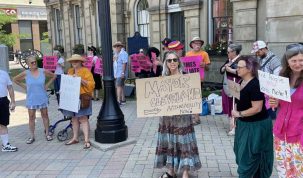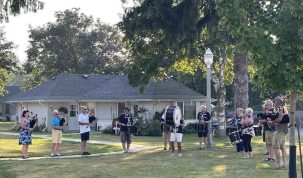
By Cecilia Nasmith/Today’s Northumberland
Cobourg Mayor Lucas Cleveland this week announced an initiative that is a first of its kind – joining with three other lower-tier Northumberland municipalities to enact a Ride Share bylaw that will enable such services as Uber and Lyft to operate locally.
This was the news with which he led off a recent interview with Today’s Northumberland, saying that including Port Hope, Brighton and Trent Hills in the bylaw – which will be coming in April – removes some of the barriers that kept these services from entering a relatively small market because its provisions are applicable in all four municipalities.
As the largest of the four municipalities, he added, they did much of the work to put it together in a way that minimizes negative impact on local taxi companies.
Much of the interview was taken up with the rationale behind the emergency shelter services bylaw that the mayor says has caused a lot of misinformation to be spread.
“They are saying Cobourg council is using this bylaw as a way of strong-arming the community,” Cleveland said, referring to the pending agreement among the town, Transition House and Northumberland County for the operation of the prospective shelter at 310 Division St.
“I want to be very specific and clear – the reality is it was thought of well before the announcement of 310.
“We are well aware of what the delivery of social services in our community creates and, while we are very fortunate in Cobourg to have these social services here, we are also very aware that there are some byproducts of those services.”
Cleveland said the bylaw was in the works before the county even purchased the property.
“I want to be very specific – what we are doing is setting standards of care for a health institution, something that is done across the entire spectrum of our society, Hospitals have standards of care, rules and regulations. Long-term care is a great example of the provincial government stepping in and setting very clear standards of care that are required to operate.
“The argument can easily be made that not having rules and regulations would allow long-term-care facilities to run easily and more effectively, but we have learned through the pandemic that that is not really a good way to behave.
“What this bylaw is doing, actually, is a bylaw to protect the most vulnerable in our community.”
He sees the bylaw as setting a base line of rules that, if broken, will bring follow-up and accountability.
The agreement being finalized for the operation of the new Transition House location is proceeding, Cleveland noted.
“But the agreement is completely separate from the bylaw,” he stressed.
Setting a March date for implementation was a way of giving notice, a chance for shelters to understand how they might be affected and to understand whether any alterations might be needed and what impacts might be affected.
“It would be wonderful if an upper level of government would take the reins and standardize what is and isn’t acceptable standard of care for emergency shelters but, in the absence of that, Cobourg is stepping up to make sure the services provided to our most vulnerable are following best practices,” he stated.
“When we are dealing with our most vulnerable, why wouldn’t we want some standards of rules and regulations that really lay out who is responsible for what. That doesn’t impede or negate the need for an agreement between Cobourg, Transition House and the county, because the agreement will ensure the community has the buy-in for these services,” Cleveland said.
“We have seen both the positive and negative effects in our community, and we are creating a bylaw – which is well within our purview to address those.”
The mayor allowed that the bylaw will not fix the problem, but he considers it a great starting point with its specifics surrounding such issues as security provision, emergency planning, policy, liability provisions and delineating who is responsible for what.
“I want to be very clear it is within our rights to draft a bylaw like this, and we are not trying to bylaw people. We are not trying to make rules and regulations against a group of individuals. That is what we are trying to avoid.”
When it comes into effect, Cleveland said, very little will change immediately except that there will be a period of implementation that involves training and education over several months. There will just be the mechanism to hold people to account if necessary.
As far as he can ascertain, Cleveland said that this bylaw is a first of its kind in Ontario to govern standards for emergency shelters.
“The City of Cobourg is unique in its willingness to stand up for what is right, and Cobourg council is unique in wanting to do what’s right for the most vulnerable,” Cleveland declared.
“This is actually a new standard, and I am really proud of this council for stepping up to the plate. In the absence of upper-level government being willing to regulate emergency shelters, it has fallen to the Cobourg level to do that,” he stated.
“This bylaw shouldn’t be feared. We don’t fear rules and regulations around long-term care. We don’t fear rules and regulations around hospitals. We demand them.
“We know the problems we are currently experiencing, and we need a methodology from which we can enforce when these rules aren’t followed.”
Asked why municipal bylaws have not been enforced in the face of the homeless encampment at the former Brookside Youth Centre, Cleveland said it was because it is provincial land and the province takes precedence in this matter.
Basically, he continued, any municipality exists as the creation of the province. The province can choose whether a municipality enforces any of its bylaws, and that was not the decision they made with regard to Brookside.
“Yes, we have bylaws. Yes, they are applicable when the provincial government decides they are applicable,” he said.
When the sale of the property closes in a few weeks, he continued, the province will be out of the picture and municipal bylaws can be invoked. But when no encampments remain on Brookside property, he reflected, that doesn’t mean all of its residents will take advantage of shelter services currently offered by the county.
“An emergency shelter isn’t the end-all and be-all of a continuum of housing solutions. In Cobourg, we are seeing what we can do to fix the housing situation.”
He was proud to report a 5% growth in new housing in Cobourg last year (“400 houses, give or take”) compared to the 0.2% to 0.3% that is more common for many municipalities.
“What we really need to start doing is looking at substance-abuse solutions, looking at rehab,” he said.
“Mayor (Olena) Hankivsky of Port Hope put forth a motion where the county is putting a quarter of a million dollars into for-profit rehab beds for individuals ready to go and make a change in their lives.
“Shelter services are part of the solution, and no one is denying that. It’s not going to fix the problem, but it’s a start.”
Another controversy the town is dealing with is stormwater rates.
This began when the province began requiring municipalities to implement asset-management protocols.
“The last term of council looked at stormwater and realized we are $1.2-million a year short of funding our stormwater reserves, which is a big deal for 20,000 residents,” Cleveland recalled.
“They decided they didn’t want to just hammer it on to the property taxes, because the big corporations and large landholders wouldn’t pay an equal share, and a majority of those charges would land on people who already have exorbitantly large property taxes.”
The decision was to base stormwater assessments on the size of the land people owned. While the average Cobourg property owner faced an annual bill of $50 to $70, some residents with large acreages (like one with 96 acres of agricultural land) would have to pay $15,000.
A recent council meeting saw well-prepared and well-spoken presentations by these people, some of whom argued for a cap on stormwater assessments.
The simple problem with that, Cleveland said, is that a landowner who otherwise owed $15,000 and benefited from a $200 cap would leave $14,800 that had to be paid by other Cobourg landowners.
He also pointed out that being taxed as agricultural land was a break these landowners are already receiving.
“Their property tax is $2,000 a year on their 90-plus acres, and we are looking at condos on the waterfront paying $10,000 in taxes for 1,100 sq. ft. – and these individuals and groups with large acreages want people who are disproportionately paying higher property taxes to bear down more of the load?”
The presenters to council did move council to have staff review the issue to see if another method of assessment might make sense.
“I think the majority of Cobourg might want to pay attention, because we don’t want to be listening to a minority group of large landowners who have the money to disproportionately put those costs on everyone else,” Cleveland said.
“I hope the community will start paying attention and having that conversation.”
This led the mayor to the larger question of ensuring sufficient reserves.
“I am a believer in saving for the future, not rolling the dice and hoping that nothing goes wrong,” he said.
“Making the right decision is often not making the politically popular decision, and it’s appropriate for us to save money.
“This is just stormwater. In 2025, you are going to see a full asset-management plan, and I think there’s going to be some sticker shock. We need to put more money away for the rainy day, because this is an old community with old infrastructure.”
The pier at the waterfront that requires a $20-to-$30-million retrofit is a key example, Cleveland said – something that should have been planned for long before now in order to avoid a $30-million debenture – especially with today’s interest rates.
Reminded that the unused lifeguard towers on the beach that originally cost $110,000 could (now that the town no longer provides lifeguard services) potentially be sold, Cleveland agreed.
On the other hand, he added, they make excellent navigational markers for search-and-rescue efforts as well as a handy place to hang those all-important signs warning that there’s no lifeguard service.























